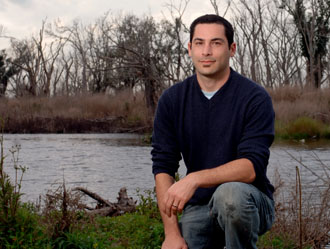Media Turn to Faculty to Grasp Oil Disaster
Last week Michael Blum, assistant professor of ecology and evolutionary biology, took MSNBC's The Rachel Maddow Show on a tour of Barataria Bay to demonstrate how Louisiana's protective barrier islands are in danger of disappearing as oil chokes oxygen from plant life.

“With oil coating surfaces of the soil and plants, you can see it [suffocates] plants,” Michael Blum, assistant professor of ecology and evolutionary biology, tells MSNBC. “You lose the anchor that the plants provide and you get rapid erosion of the islands.” (Photo by Paula Burch-Celentano)
Ever since the Deepwater Horizon oil rig explosion on April 20, Tulane faculty members have been called on by the national media to discuss the impact of the ensuing oil leak on wildlife, human health, the economy and the culture of the Gulf Coast.
Blum pointed out that in addition to serving as breeding grounds for the brown pelican and other species, the barrier islands protect the Louisiana coast from hurricanes and tropical storms.
Alex Kolker, adjunct research professor of earth and environmental sciences, also addresses the fragile ecosystem of the Louisiana coast in a Christian Science Monitor story.
And in The New York Times, Caz Taylor, assistant professor of ecology and evolutionary biology, observes that oil is covering shoals preferred by migrating crabs.
LuAnn White, director of the Tulane Center for Applied Environmental Health, is quoted in Time magazine regarding the oil spill and its potential to ruin sensitive bird-breeding areas. White, a toxicology expert, also has been interviewed about the effects of the oil and dispersants on human health.
As British Petroleum, the oil company that owns the rig, has attempted to stop the oil flow, Eric Smith, associate director of the Tulane Energy Institute, has defined procedures such as “top kill,” “junk shot” and containment domes. Featured on NPR, MSNBC and Fox, Smith has cautioned that a six-month moratorium on deepwater drilling may hurt the economy.
In USA Today, Mark Davis, director of the Tulane Institute on Water Resources Law and Policy, says that the Louisiana seafood and tourism industries will feel the effects of the oil spill for years.
McClatchy reports that law professor Oliver Houck predicts that the largest environmental disaster in U.S. history may result in billions of dollars of legal liability for BP.
